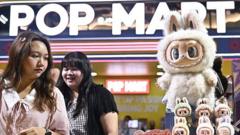Pop Mart, the Chinese toy maker behind the wildly popular Labubu dolls, announced a staggering profit increase for the first half of this year, projecting a sky-high surge of at least 350% as revenue sees a remarkable tripling. Based in Beijing, the company attributes its success to enhanced global brand recognition and diligent cost controls, significantly contributing to its impressive profitability.
Renowned for its unique approach to toy sales through "blind boxes," Pop Mart has garnered a loyal following, particularly for its Labubu dolls—quirky elf-like characters sporting a set of jagged teeth. These adorable figures have sparked a buying frenzy, leading to long queues in stores worldwide. With a market valuation exceeding $40 billion (£31.6 billion), Pop Mart's growth trajectory has seen a staggering 600% rise in stock value since its 2020 debut on the Hong Kong Stock Exchange.
Sales outside of mainland China have dramatically contributed to revenue, accounting for nearly 40% of total earnings in 2024. Retailers globally have been challenged to keep up with the overwhelming demand for Labubu dolls, especially in the US market. Celebrity endorsements from figures such as Kim Kardashian and Lisa of K-pop group Blackpink have markedly increased Labubu's visibility and desirability.
Partnerships with major brands like Coca-Cola and One Piece have further propelled the dolls' popularity. Data from equity research firm M Science showed a stunning 5,000% increase in Labubu sales in the US this June compared to the previous year. Analyst Vinci Zhang noted the unprecedented growth, stating, "I've not seen anything like this from other toy companies." Pop Mart has enormous growth potential in the US market, having established just under 40 stores compared to roughly 400 in China.
The hype surrounding Labubu has also fostered a thriving resale market, with original dolls priced around $10 often reselling for hundreds. A remarkable auction in Beijing saw a human-sized Labubu fetch an astonishing $150,000. However, this soaring popularity has also given rise to counterfeit products, known as Lafufu dolls, prompting Chinese authorities to seize over 46,000 fake toys in a crackdown on the burgeoning black market. Thus, while Labubu's ascent marks a triumph for Pop Mart, it also highlights the challenges and complexities of a booming toy phenomenon.
Renowned for its unique approach to toy sales through "blind boxes," Pop Mart has garnered a loyal following, particularly for its Labubu dolls—quirky elf-like characters sporting a set of jagged teeth. These adorable figures have sparked a buying frenzy, leading to long queues in stores worldwide. With a market valuation exceeding $40 billion (£31.6 billion), Pop Mart's growth trajectory has seen a staggering 600% rise in stock value since its 2020 debut on the Hong Kong Stock Exchange.
Sales outside of mainland China have dramatically contributed to revenue, accounting for nearly 40% of total earnings in 2024. Retailers globally have been challenged to keep up with the overwhelming demand for Labubu dolls, especially in the US market. Celebrity endorsements from figures such as Kim Kardashian and Lisa of K-pop group Blackpink have markedly increased Labubu's visibility and desirability.
Partnerships with major brands like Coca-Cola and One Piece have further propelled the dolls' popularity. Data from equity research firm M Science showed a stunning 5,000% increase in Labubu sales in the US this June compared to the previous year. Analyst Vinci Zhang noted the unprecedented growth, stating, "I've not seen anything like this from other toy companies." Pop Mart has enormous growth potential in the US market, having established just under 40 stores compared to roughly 400 in China.
The hype surrounding Labubu has also fostered a thriving resale market, with original dolls priced around $10 often reselling for hundreds. A remarkable auction in Beijing saw a human-sized Labubu fetch an astonishing $150,000. However, this soaring popularity has also given rise to counterfeit products, known as Lafufu dolls, prompting Chinese authorities to seize over 46,000 fake toys in a crackdown on the burgeoning black market. Thus, while Labubu's ascent marks a triumph for Pop Mart, it also highlights the challenges and complexities of a booming toy phenomenon.






















